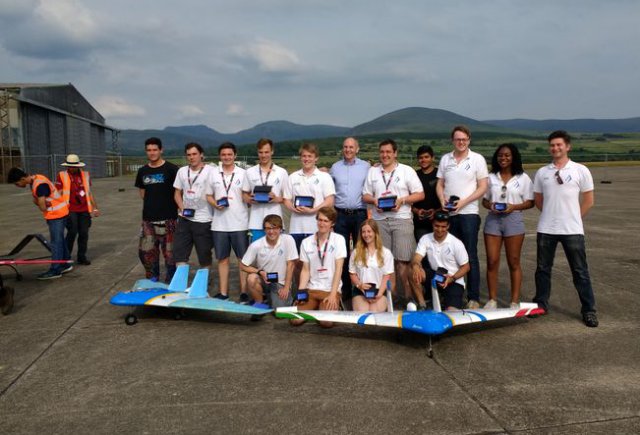 Engineering students from Bath University have beaten other undergraduate teams to be crowned overall winners of the Institution of Mechanical Engineers’ Unmanned Aircraft Systems (UAS) Challenge.
Engineering students from Bath University have beaten other undergraduate teams to be crowned overall winners of the Institution of Mechanical Engineers’ Unmanned Aircraft Systems (UAS) Challenge.
Now in its third year, the annual event encourages teams of undergraduates to undertake a full design and build cycle of a UAS, also known as a drone, with specific mission objectives – before competing in a final ‘fly-off’ and judging on 19th and 20th June.
Alex Powell, Team Leader of Bath University, said: “The team is over the moon to be crowned UAS Challenge grand champions. It was a long road to get here and we are all extremely pleased with the final result. All of us are still in shock at getting the award which made all those long nights in the lab worth it.”
“The team would also like to thank our supervisors for the help along the way, our sponsors for their contributions and the Department of Engineering at the University for the support provided. Finally, thank you to all of the other teams for making it such a great event. We all had a fantastic time making new friends and we are look forward to defending our title next year.”
Rod Williams, Chief Scrutineer of the UAS Challenge, said: “The teams at UAS Challenge 2017 have shown a great deal of skill in integrating a range of technical systems to develop an excellent set of very viable aircraft. The enthusiasm and team work shown was first class and they have applied considerable academic knowledge. In scrutineering, we were able to inspect closely the platforms’ structural and systems integrity and assess the airworthiness of the aircraft as a whole.
“Across the board, the teams had grasped the technical attributes required and the implications of air safety – the challenge proved an invaluable means of converting theoretical designs into practical, safe and capable aircraft. They have reacted well to meet challenging manufacturing requirements, refining solutions to evolving airworthiness issues or effecting practicable repairs without compromising safety.
“A marvellous effort all-round, with some exceptional aerospace engineering performances. Well done to all teams, an excellent and enjoyable event.”
Students from 17 universities including Southampton, Sheffield, Bath, Nottingham, Swansea and Loughborough as well as Karachi and Istanbul, competed in the fly-off to determine the winner of this year’s competition.
This is the third consecutive year that Northrop Grumman has sponsored the UAS Challenge as part of its global initiative to encourage innovative thinking in engineering and technology among today’s youth. The competition is designed to bridge the gap between academia and industry in developing applied UAS-related activities, giving students an opportunity to strengthen links with industry, as well as enhance employment opportunities.
The overall Grand Champions of the UAS Challenge 2017 were Team Bath Drones from Bath University. They also earned the category awards for design and innovation.
The competition required the teams to design and build a UAS and demonstrate its operation in a humanitarian supply mission scenario. The aircraft had to operate autonomously, perform a series of tasks such as area search, navigating waypoints, accurately dropping a payload and returning to base via a defined route. In the live fly-off final, the teams of young engineers were challenged to transport an aid package as rapidly and accurately as possible. Additionally, the teams were tested to explain the commercial viability of their solutions with a ‘dragons den’ style pitch to competition judges.
“Unmanned aircraft systems have a wide range of proven applications not just in defence and security, but also in civil missions such as environmental monitoring, humanitarian relief, search and rescue, and disaster relief operations,” said Andrew Tyler, chief executive, Northrop Grumman Europe. “This competition provides an opportunity for students to broaden their understanding of UAS technologies and gain valuable experience and practical aerospace engineering skills which they can take forward in their future careers in engineering.”
Northrop Grumman and the Northrop Grumman Foundation are committed to expanding and enhancing the pipeline of diverse, talented STEM students globally. They provide funding for sustainable STEM programmes from schools through to universities, with a major emphasis on middle school students and teachers.
In 2016, Northrop Grumman and the Northrop Grumman Foundation continued outreach efforts by contributing more than £23 million globally to support diverse STEM-related activities and groups such as: in the U.S., the Air Force Association CyberPatriot cyber security competition and the Northrop Grumman Foundation Teachers Academy (in partnership with the National Science Teachers Association); in the U.K., the CyberCenturion cyber defence competition; Cyber Arabia; and the REC Foundation VEX Robotics competition which includes Australia, Japan, South Korea and the U.S.
The final results of the competition saw Bath University crowned as overall grand champions. Winners of the other categories were:
• Design – Bath University
• Innovation – Bath University
• Most Viable Business Proposition – University of Dundee
• Safety and Airworthiness – Huddersfield University
• Autonomous/Automatic Operations – Loughborough University
• Manufacturing – Istanbul Technical University
• Navigation Authority – Southampton (Valkyrie)
• Environmentally friendly – Queens University Belfast
• Most Promise – University of the West of England
• Endurance – Loughborough University
• Payload Delivery – Southampton (Olympus)
Source: Press Release
